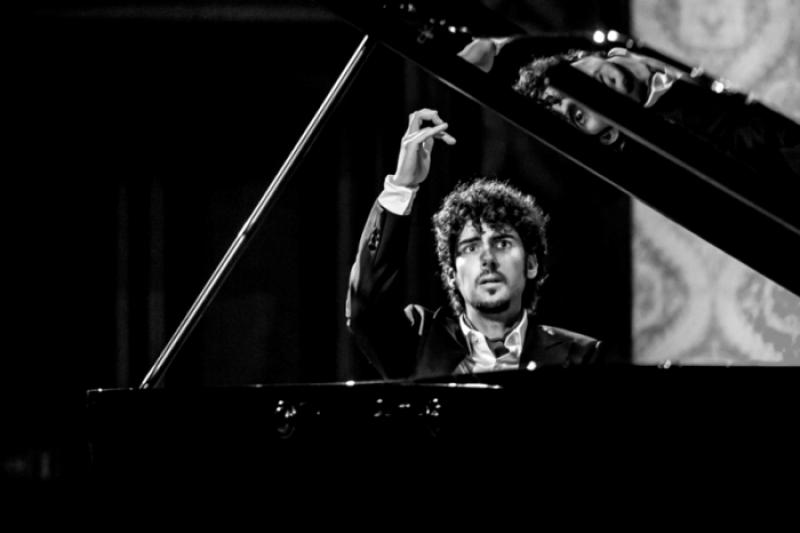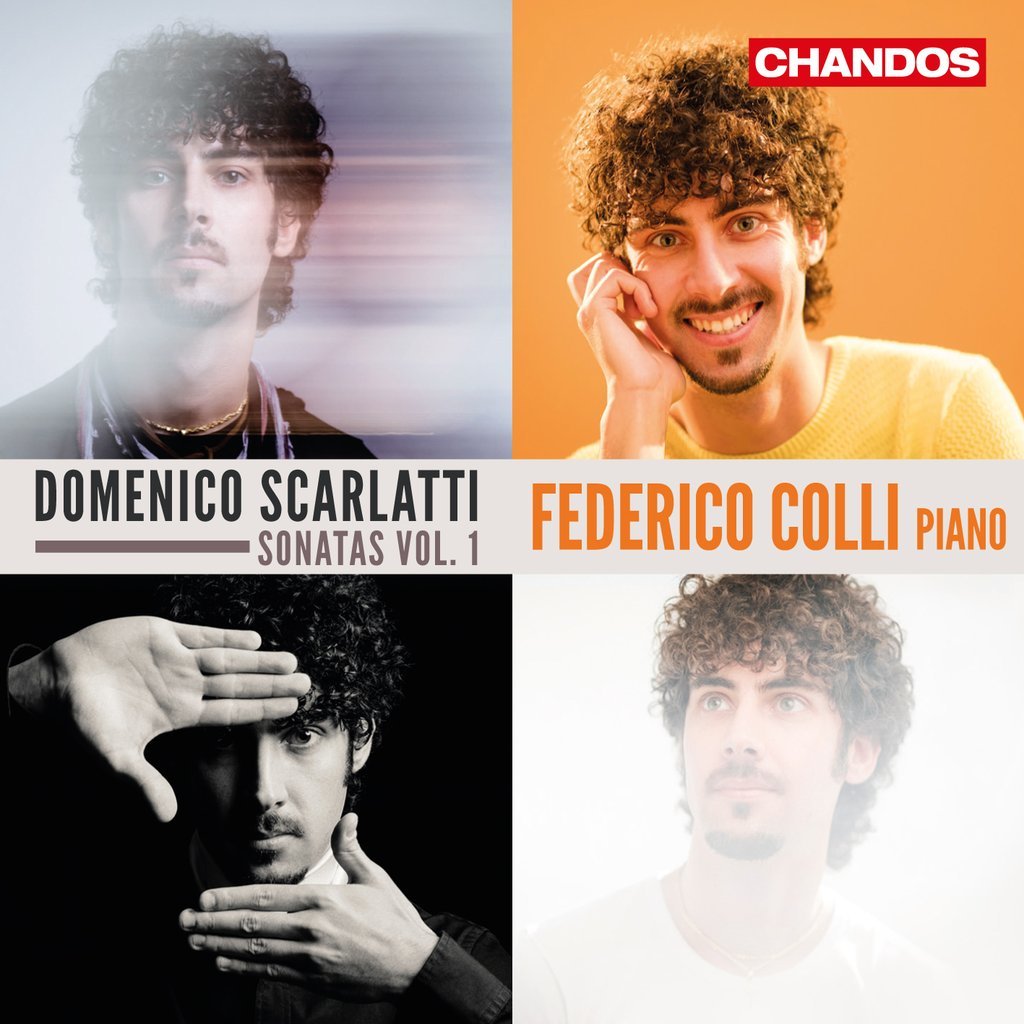Federico Colli, Wigmore Hall review – poised on the edge of the possible | reviews, news & interviews
Federico Colli, Wigmore Hall review – poised on the edge of the possible
Federico Colli, Wigmore Hall review – poised on the edge of the possible
The young Italian pianist brings a fantastical, probing imagination to a chewy programme

The Italian pianist Federico Colli, 30, best known so far as winner of the 2012 Leeds International Piano Competition, last night arrived for his Wigmore Hall debut sporting an emerald-green cravat, but the sonic colours he magicked out of the piano quickly put its gleam in the shade.
Colli had nevertheless picked a somewhat unforgiving programme – a first half entirely of Scarlatti and a second of chewingly unremitting D minor – and if at times the result was more impressive than it was emotionally satisfying, that was chiefly to do with the selection of pieces.
Eleven Scarlatti sonatas on the trot might be standard enough fare for a CD (sure enough, Colli has one just out, reviewed on theartsdesk by Graham Rickson and pictured below), but in a recital it can be a strange prospect for the audience. Each piece has basically the same "binary" form, with two halves, each repeated; it’s the ceaseless creativity Scarlatti pours into this mould that counts. Colli ingeniously solved the problem of repetitiveness, building a sequence of sonatas involving powerful contrasts of tempi and dynamic, but above all of colour. Could any oil paint palette match him at that black and white keyboard?
 He seems to find the very edge of what’s possible and acceptable at the piano, then plays poised on that edge without ever quite tumbling off: this playing is secure, but never safe, and that applies to the softest, quietest side of it as much as to the pyrotechnics. For the Scarlatti sonatas in D minor Kk32 ("Aria") and Kk208 in A major, the risk was to find a tone so whispered that the music could have failed to emerge altogether - have we ever heard quite such a quiet sound from a normal Steinway? - yet without sacrificing eloquence or the integrity of line. In the rapid numbers, like the concluding Kk39 presto, he unleashed cascades of repeated notes, magnificently articulated fingerwork, an intriguing yet generally convincing sense of rubato and almost operatically phrased melody. Perhaps most remarkable is the sense that however risky all this was, nothing was happening that was not actually inside the music already, waiting to be drawn out.
He seems to find the very edge of what’s possible and acceptable at the piano, then plays poised on that edge without ever quite tumbling off: this playing is secure, but never safe, and that applies to the softest, quietest side of it as much as to the pyrotechnics. For the Scarlatti sonatas in D minor Kk32 ("Aria") and Kk208 in A major, the risk was to find a tone so whispered that the music could have failed to emerge altogether - have we ever heard quite such a quiet sound from a normal Steinway? - yet without sacrificing eloquence or the integrity of line. In the rapid numbers, like the concluding Kk39 presto, he unleashed cascades of repeated notes, magnificently articulated fingerwork, an intriguing yet generally convincing sense of rubato and almost operatically phrased melody. Perhaps most remarkable is the sense that however risky all this was, nothing was happening that was not actually inside the music already, waiting to be drawn out.
Opening the second half with Mozart’s D minor Fantasia, Colli was able to explore that free, quasi-improvisatory atmosphere some more before launching with purple velvet tone into the Brahms Theme and Variations in D minor (transcribed by the composer from his String Sextet No.1), followed without a break by Busoni’s transcription of the Bach D minor Chaconne.
Any violinist worth his/her salt can make the Chaconne into a fantastical personal statement, and Busoni’s multidimensional, no-holds-barred piano reimagining of it let Colli off his leash in a breathtaking slalom of enormous intensity, contrast and power. His sound has a deep, cushioned, luminous quality at all levels and such is his control of voicing that at times you might almost imagine the piano had been transformed into an organ, with different-timbred pipes for the various registers positioned all over the hall. An illusion, of course, but a glorious one.
Two encores - Colli’s own gentle version of Handel’s "Lascia ch'io pianga" and then Dame Myra Hess’s transcription of Bach’s "Jesu, Joy of Man’s Desiring" brought a remarkable evening to its close. It takes a technique and a half to make a piano sound like that - and, even more crucially, exceptional artistry to dream up the desire for those sounds in the first place.
rating
Explore topics
Share this article
The future of Arts Journalism
You can stop theartsdesk.com closing!
We urgently need financing to survive. Our fundraising drive has thus far raised £49,000 but we need to reach £100,000 or we will be forced to close. Please contribute here: https://gofund.me/c3f6033d
And if you can forward this information to anyone who might assist, we’d be grateful.

Subscribe to theartsdesk.com
Thank you for continuing to read our work on theartsdesk.com. For unlimited access to every article in its entirety, including our archive of more than 15,000 pieces, we're asking for £5 per month or £40 per year. We feel it's a very good deal, and hope you do too.
To take a subscription now simply click here.
And if you're looking for that extra gift for a friend or family member, why not treat them to a theartsdesk.com gift subscription?
more Classical music
 Jansen, LSO, Pappano, Barbican review - profound and bracing emotional workouts
Great soloist, conductor and orchestra take Britten and Shostakovich to the edge
Jansen, LSO, Pappano, Barbican review - profound and bracing emotional workouts
Great soloist, conductor and orchestra take Britten and Shostakovich to the edge
 Jakub Hrůša and Friends in Concert, Royal Opera review - fleshcreep in two uneven halves
Bartók kept short, and a sprawling Dvořák choral ballad done as well as it could be
Jakub Hrůša and Friends in Concert, Royal Opera review - fleshcreep in two uneven halves
Bartók kept short, and a sprawling Dvořák choral ballad done as well as it could be
 Hadelich, BBC Philharmonic, Storgårds, Bridgewater Hall, Manchester review - youth, fate and pain
Prokofiev in the hands of a fine violinist has surely never sounded better
Hadelich, BBC Philharmonic, Storgårds, Bridgewater Hall, Manchester review - youth, fate and pain
Prokofiev in the hands of a fine violinist has surely never sounded better
 Monteverdi Choir, ORR, Heras-Casado, St Martin-in-the-Fields review - flames of joy and sorrow
First-rate soloists, choir and orchestra unite in a blazing Mozart Requiem
Monteverdi Choir, ORR, Heras-Casado, St Martin-in-the-Fields review - flames of joy and sorrow
First-rate soloists, choir and orchestra unite in a blazing Mozart Requiem
 Cho, LSO, Pappano, Barbican review - finely-focused stormy weather
Chameleonic Seong-Jin Cho is a match for the fine-tuning of the LSO’s Chief Conductor
Cho, LSO, Pappano, Barbican review - finely-focused stormy weather
Chameleonic Seong-Jin Cho is a match for the fine-tuning of the LSO’s Chief Conductor
 Classical CDs: Shrouds, silhouettes and superstition
Cello concertos, choral collections and a stunning tribute to a contemporary giant
Classical CDs: Shrouds, silhouettes and superstition
Cello concertos, choral collections and a stunning tribute to a contemporary giant
 Appl, Levickis, Wigmore Hall review - fun to the fore in cabaret and show songs
A relaxed evening of light-hearted fare, with the accordion offering unusual colours
Appl, Levickis, Wigmore Hall review - fun to the fore in cabaret and show songs
A relaxed evening of light-hearted fare, with the accordion offering unusual colours
 Lammermuir Festival 2025, Part 2 review - from the soaringly sublime to the zoologically ridiculous
Bigger than ever, and the quality remains astonishingly high
Lammermuir Festival 2025, Part 2 review - from the soaringly sublime to the zoologically ridiculous
Bigger than ever, and the quality remains astonishingly high
 BBC Proms: Ehnes, Sinfonia of London, Wilson review - aspects of love
Sensuous Ravel, and bittersweet Bernstein, on an amorous evening
BBC Proms: Ehnes, Sinfonia of London, Wilson review - aspects of love
Sensuous Ravel, and bittersweet Bernstein, on an amorous evening
 Presteigne Festival 2025 review - new music is centre stage in the Welsh Marches
Music by 30 living composers, with Eleanor Alberga topping the bill
Presteigne Festival 2025 review - new music is centre stage in the Welsh Marches
Music by 30 living composers, with Eleanor Alberga topping the bill
 Lammermuir Festival 2025 review - music with soul from the heart of East Lothian
Baroque splendour, and chamber-ensemble drama, amid history-haunted lands
Lammermuir Festival 2025 review - music with soul from the heart of East Lothian
Baroque splendour, and chamber-ensemble drama, amid history-haunted lands
 BBC Proms: Steinbacher, RPO, Petrenko / Sternath, BBCSO, Oramo review - double-bill mixed bag
Young pianist shines in Grieg but Bliss’s portentous cantata disappoints
BBC Proms: Steinbacher, RPO, Petrenko / Sternath, BBCSO, Oramo review - double-bill mixed bag
Young pianist shines in Grieg but Bliss’s portentous cantata disappoints
